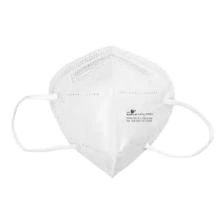Get A Quote
BIS Certification for Respiratory Protective Devices – Filtering Half Masks IS 9473

In industries where workers are
exposed to airborne particles, such as dust, mists, or fumes, respiratory
protection is non-negotiable. This is where filtering half masks come in, providing critical defense against
harmful particles. But how can users and buyers be sure these masks meet recognized safety and quality standards?
The answer lies in BIS certification under Indian Standard IS 9473. Let’s explore what this means, why it matters, and how manufacturers can secure the ISI Mark for Respiratory Protective Devices.
What is IS 9473?
IS 9473:2002 is the Indian standard
for respiratory protective devices — filtering half masks to protect against
particles. It outlines the design, performance, and testing requirements that
filtering half masks must meet to ensure they provide effective particle
protection in occupational settings.
Specifically, IS 9473 covers:
This standard ensures the masks are fit for industrial use, protecting workers from inhaling harmful airborne particles.
Why is BIS Certification
Important?
The Bureau of Indian Standards (BIS)
mandates certification for many safety-related products, including respiratory
protective devices under IS 9473. Without this certification, manufacturers
cannot legally sell or distribute these products in the Indian market.
The ISI Mark certification for Respiratory Protective Devices is proof that the product has passed rigorous testing and inspection, aligning with the required Indian standards.
Benefits of ISI
Certification for Respiratory Protective Devices
Here’s why obtaining the ISI
certification for Respiratory Protective Devices is crucial:
● Regulatory Compliance: Compliance with
IS 9473 is mandatory, and only products bearing the ISI Mark for Respiratory
Protective Devices are permitted for sale in India.
●Worker Safety: Certified masks guarantee
protection levels that meet national safety benchmarks, safeguarding worker
health.
●Market Trust: Industrial buyers and
safety managers rely on the ISI Mark certification for Respiratory Protective
Devices as a trusted indicator of performance and quality.
● Competitive Edge: ISI-certified products gain an advantage in government tenders, corporate contracts, and regulated industries where compliance is non-negotiable.
How to Obtain ISI Mark
Certification for Respiratory Protective Devices
For manufacturers, the process to
achieve ISI Mark certification for Respiratory Protective Devices involves
several key steps:
- Application
Submission: Submit the completed application
form with necessary documentation to BIS.
- Document Review: BIS evaluates the submitted documents to verify accuracy and
completeness.
- Factory Inspection: BIS officials conduct on-site inspections to assess
manufacturing processes and quality control systems.
- Sample Testing: Product samples are collected and tested at BIS-approved
laboratories to verify compliance with Indian standards.
- Certification Grant: Upon successful inspection and testing, the BIS issues the certification, allowing the use of the ISI Mark.
Documents Required for BIS Certification
To apply for ISI
Certification for Respiratory Protective Devices, manufacturers must provide
the following documents:
● Completed application form
● Detailed manufacturing process
information
● Quality control plans and test
reports
● Factory layout and equipment
details
● Product specifications and
technical details
● Business registration proof
● Declaration of conformity to
Indian standards
BIS ISI Mark Certification Costing And Timeline
To Know The Process in Detail, Please Visit:
Under BIS Registration Products ISI and CRS
Conclusion
The Indian standard for Respiratory
Protective Devices (IS 9473) is vital for ensuring workplace safety, especially
in industries with significant airborne hazards. Manufacturers who secure the
ISI Mark certification for Respiratory Protective Devices not only fulfill
legal requirements but also demonstrate a commitment to product quality and
worker protection.
For buyers, the ISI Mark for
Respiratory Protective Devices serves as a reliable assurance that the mask
they’re purchasing meets stringent Indian safety standards, providing
confidence and peace of mind.
Free Call Back
Latest News & Update
📅 BIS Critical Component List (CCL) Updates for Solar PV Modules
🕒 BIS Fee Concessions for MSMEs and Startups | EVTL India
📅 Guidelines for Implementation of Essential Requirements for Security of CCTV
🕒 Omnibus Technical Regulation (OTR) Amendment Order, 2025
🕒 Extension of Timeline for Filing Annual Returns by Battery Producers
📅 Extension of Timeline for Filing Quarterly and Annual Returns for E-Waste
🕒 Extension of Concurrent Running Period for IS 302-1: 2008 and IS 302 (Part 1): 2024
🕒 BIS Guidelines for Grant of Licence (GoL) | EVTL India
📅 CPCB Guidance on filing of Application, Fees and more
🕒 CPCB Notification on Labelling of Plastic Packaging
📅 Mandatory Compliance for Input Materials of Steel and Steel Products for Imports
🕒 BIS Guidelines for Scheme-X Certification for OTR-Regulated Products
📅 BIS Upgrades Product Certification License Numbers to 10-Digit Series
🕒 BIS Certification No Longer Mandatory for 14 Chemical & Polymer Categories
Why Choose EVTL INDIA
Expertise in Indian Regulatory Standards
End-to-End Support
Trusted by Top Indian & Global Brands
Fast Processing & Transparent Pricing
Strong Liaison with Indian Authorities
Company Profile














